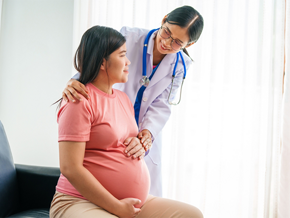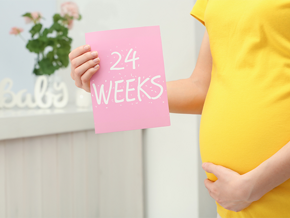
Hearing you have a high-risk pregnancy can be overwhelming, but don't let it cloud the joy of welcoming a new life. This diagnosis simply means you require specialized care and closer teamwork with your doctor to prevent potential pregnancy complications.
Here are simple ways to prepare physically and emotionally for the journey ahead.
What Is a High-Risk Pregnancy?
A high-risk pregnancy means you have a condition that puts you and your baby at a higher-than-average risk of health problems. This condition can be pre-existing or one that develops along the way.
Pre-existing conditions
Your age is one of the most significant factors that can increase your risk of pregnancy problems, such as gestational diabetes and hypertensive disorders like preeclampsia.
Expectant moms over 35 (known as advanced maternal age or AMA) often require closer monitoring because they have a higher chance of developing gestational diabetes and hypertensive disorders.
Other pre-existing conditions that may complicate your pregnancy no matter your age include:
- Chronic high blood pressure
- Diabetes (Type 1 or 2)
- Autoimmune diseases, like lupus or thyroid issues
- Kidney or heart disease
- Being overweight or underweight
Pregnancy-related conditions
Some of the complications you can develop when you're expecting are:
- Preeclampsia: A serious condition characterized by high blood pressure that can affect all your organs
- Gestational diabetes: A type of diabetes that only occurs during pregnancy
- Multiple gestation: Carrying twins, triplets, or more increases the risk of premature labor and other complications
- Placenta previa: A situation where the placenta covers part or all of the cervix
What to Expect From Your Prenatal Care
Having a high-risk pregnancy may require frequent visits with your ob-gyn. Your primary doctor may also ask you to see perinatologist, a specialist in high-risk pregnancies, especially as your due date approaches.
To catch potential pregnancy problems early, you may need additional tests, such as:
- Detailed ultrasounds to check your baby’s anatomy and growth more closely
- Biophysical profiles, a combination of ultrasound and a non-stress test, to check on your baby’s well-being
- Amniocentesis procedure to diagnose certain genetic conditions and check for fetal lung maturity
- Regular blood and urine tests to monitor for conditions like preeclampsia and gestational diabetes
Diet and Lifestyle Tips to Stay Healthy

A balanced diet rich in essential nutrients plays a key role in managing a high-risk pregnancy and supporting your baby’s growth.
Your daily habits have a huge impact on your pregnancy, and maintaining a healthy lifestyle is crucial when managing a high-risk pregnancy.
1. Nourish your body.
According to the Food and Nutrition Research Institute's (FNRI) dietary guidelines, you typically need about 300 extra calories per day during your second and third trimesters. You'll also need more protein and essential nutrients such as iron and folate.
Consult your doctor or nutritionist about meal plans tailored to your specific needs. For instance, if you have gestational diabetes, you'll need to monitor your carbohydrate intake carefully.
2. Stay active.
Gentle exercises, such as walking or prenatal yoga, can help manage stress, improve circulation, and prepare your body for labor.
A 2024 review in the Journal of Personalized Medicine found that physical exercise is a safe tool that can help reduce the risk of common complications for both mom and baby in many high-risk pregnancies. However, always get your doctor’s approval first. They can tailor an activity plan that’s safe for you and your baby.
3. Get enough rest.
Your body is working overtime to grow your baby. Aim for at least eight hours of sleep each night. If you're having trouble sleeping, try using pillows for support and establishing a relaxing bedtime routine to help you get a good night's rest.
Caring for Your Emotional Health
It's okay to feel anxious, scared, or even sad when you have a sensitive pregnancy. Your emotional health is just as important as your physical health, and these feelings are incredibly common.
1. Acknowledge your feelings.
A 2024 study on prenatal depression in The Open Nursing Journal shows that high-risk pregnancy stress is a significant factor affecting emotional well-being. So, don't dismiss your emotions.
Talk about your worries with your partner, a trusted friend, or a family member. Don’t hesitate to reach out to a mental health professional if you’re feeling persistently anxious or down. Early support can make a big difference.
2. Build your support network.
According to the World Health Organization (WHO), strong social support can positively impact the mental health of expectant mothers. This support system can include your healthcare team, partner, relatives, and friends.
Consider joining a support group for mothers with high-risk pregnancies, where you can connect with others who understand what you’re going through.
3. Practice mindfulness and relaxation.
A 2025 review and meta-analysis published in the journal Healthcare shows that mindfulness programs are a "useful and effective means of reducing maternal stress, anxiety, and depression" during pregnancy.
Even if you only have a few minutes, dedicating time to these practices can make a real difference. There are many apps and online videos that can guide you through them from the comfort of your home.
Preparing for Your Baby’s Arrival

Discussing your birth plan with your doctor is a proactive step that can reduce stress and help you feel prepared.
As you move closer to your delivery date, it’s time to finalize your birth plan and get your finances in order.
Assemble your birth team
Your ob-gyn leads your birth team, which also includes the nurses, your partner, and anyone else you want to be there for support, like a doula. If you're at risk for early labor, ask your doctor about possible delivery outcomes, including the need for a NICU (neonatal intensive care unit) or cesarean birth.
Plan for emergencies
Keep emergency numbers and your hospital’s contact information easily accessible. Contact your doctor right away if you notice any of these warning signs:
- Severe headaches
- Sudden swelling
- Blurred vision
- Heavy bleeding
- Abdominal pain
Prepare your finances
Specialized care and potential hospital stays can be costly. Review your health insurance coverage and start saving for out-of-pocket expenses. Knowing you have a financial cushion can help alleviate stress.
Questions to Ask Your Ob-Gyn
You may feel shy during your check-ups, but your questions are important and asking them can help you feel more prepared. Here are a few to get you started:
- How does my condition affect my baby's development?
- What are the specific high-risk pregnancy symptoms or warning signs I should watch for?
- What changes should I make to my daily routine?
- What is the plan for my labor and delivery?
- Who should I contact if I have an urgent concern outside of business hours?
A high-risk pregnancy may present challenges, but by taking care of yourself physically and mentally, you can prepare for your little one’s arrival with confidence.
Connect with other parents on the ParentTeam Moms and Dads Facebook group and share your tips for managing a high-risk pregnancy.
References
American College of Obstetricians and Gynecologists (ACOG), The. "Physical Activity and Exercise During Pregnancy and the Postpartum Period." Committee Opinion No. 804, April 2020. Accessed June 17, 2025. https://www.acog.org/clinical/clinical-guidance/committee-opinion/articles/2020/04/physical-activity-and-exercise-during-pregnancy-and-the-postpartum-period
Cleveland Clinic. "High-Risk Pregnancy." Last reviewed July 12, 2024. Accessed June 17, 2025. https://my.clevelandclinic.org/health/diseases/22190-high-risk-pregnancy
Glick, I., E. Kadish, and M. Rottenstreich. "Management of Pregnancy in Women of Advanced Maternal Age: Improving Outcomes for Mother and Baby." International Journal of Women's Health 13 (2021): 751–59. https://doi.org/10.2147/IJWH.S283216
Hadiwinata, Gideon, Tono Djuwantono, and Dodi Suardi. "Effect of Advanced Maternal Age on Pregnancy Outcome: A Retrospective Study from Three Academic Teaching Hospitals in Indonesia." Journal of Obstetrics, Gynecology and Cancer Research, March 13, 2025. https://doi.org/10.30699/jogcr.10.5.383
KidsHealth. "What's a 'High-Risk' Pregnancy?" Medically reviewed by Thinh Phu Nguyen. July 2022. Accessed June 17, 2025. https://kidshealth.org/en/parents/high-risk.html
Lazzari, Cecilia, Mariachiara Bosco, Simone Garzon, Chiara Simonetto, Jvan Casarin, Sonia Paolucci, Antonella Cromi, et al. "The Impact of Maternal Age and Body Mass Index on Hypertensive Disorders of Pregnancy: Moving beyond the Cut-Off Effect." Pregnancy Hypertension 40 (2025): 101219. https://doi.org/10.1016/j.preghy.2025.101219
Mayo Clinic. "High-risk pregnancy: Know what to expect." January 25, 2024. Accessed June 17, 2025. https://www.mayoclinic.org/healthy-lifestyle/pregnancy-week-by-week/in-depth/high-risk-pregnancy/art-20047012
Montori, M. Guarga, A. Álvarez Martínez, C. Luna Álvarez, N. Abadía Cuchí, P. Mateo Alcalá, and S. Ruiz-Martínez. “Advanced Maternal Age and Adverse Pregnancy Outcomes: A Cohort Study.” Taiwanese Journal of Obstetrics and Gynecology 60, no. 1 (2021): 119–24. https://doi.org/10.1016/j.tjog.2020.11.018
National Institute of Child Health and Human Development. "What is a high-risk pregnancy?" Last reviewed January 31, 2017. Accessed June 17, 2025. https://www.nichd.nih.gov/health/topics/pregnancy/conditioninfo/high-risk
Tagami, K., N. Iwama, H. Hamada, H. Tomita, R. Kudo, N. Kumagai, H. Wang, et al. "Advanced Maternal Age Is a Risk Factor for Both Early and Late Gestational Diabetes Mellitus: The Japan Environment and Children's Study." Journal of Diabetes Investigation 16, no. 4 (2025): 735–43. https://doi.org/10.1111/jdi.14400.
World Health Organization (WHO). WHO guidelines on physical activity and sedentary behaviour. November 25, 2020. Accessed June 17, 2025. https://www.who.int/publications/i/item/9789240015128.




























